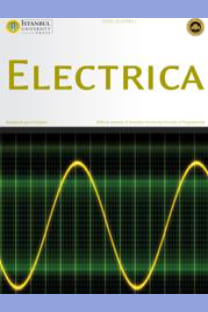Comparison OF Wavelet Based Feature Extraction Methods for Speech/Music Discrimination
Comparison OF Wavelet Based Feature Extraction Methods for Speech/Music Discrimination
-,
___
- Ambikairajah, O. M. E., Epps, J., “Novel features for effective speech and music discrimination,” in Proc. IEEE Int. Conf. on Engineering of Intelligent Systems, pp. 1–5, 2006.
- Exposito, N. R. J.E.M., Galan, S.G., Candeas, P., “Audio coding improvement using evolutionary speech/music discrimination,” in Proc. IEEE Int. Conf. on Fuzzy Systems (FUZZ-IEEE), pp. 1–6, 2007.
- El-Maleh, K., Petrucci, M. G., Kabal, P., “Speech/music discrimination for multimedia applications,” in Proc. IEEE Int. Conf. on Acoustics, Speech, and Signal Processing, pp. 2445–2448, 2000.
- Gedik, A., Bozkurt, B., “Pitch frequency histogram based music information retrieval for turkish music,” Signal Processing, vol. 10, pp. 1049–1063, 2010.
- Saunders, J., “Real time discrimination of broadcast speech/music,” in Proc. IEEE Int. Conf. on Acoustics, Speech, and Signal Processing, pp. 993–996, 1996.
- Scheier, E., Slaney, M., “Construction and evaluation of a robust multifeature speech/music discriminator,” in Proc. IEEE Int. Conf. On Acoustics, Speech, and Signal Processing, ICASSP’97, pp. 1331–1334, 1997
- Ajmera, I. M. J., Bourlard, H., “Speech/music segmentation using entropy and dynamism features in a HMM classification framework,” Speech Communication, vol. 40, pp. 351–363, 2003.
- Panagiotakis, C., Tziritas, G., “A speech/music discriminator based on RMS and zero-crossings,” IEEE Trans. Multimedia, vol. 7, pp. 155–166, 2005.
- Tzanetakis, G. E. G., Cook, P., “Audio analysis using the discrete wavelet transform,” in Proc. Conf. in Acoustics and Music Theory Applications. WSES, pp. 318–323, 2001.
- Didiot E., Illina, I., Fohr, D., Mella, O., “A wavelet- based parameterization for speech/music discrimination,” Computer Speech and Language, vol. 24, pp. 341–357, 2010. [11] Ntalampiras, S., Fakotakis, N., “Speech /music discrimination based on discrete wavelet transform,” in Proc. of 5th Hell. Conf. On Art.Int., SETN’08, LNAI 5138, Greece, Oct. 2008, pp. 205–211, 2008
- Khan, M., Al-Khatib, W., “Machine-learning based classiŞcation of speech and music,” ACM Jour. on Multimedia Systems, vol. 12, pp. 55–67, 2006.
- Mallat, S., A wavelet tour of signal processing. Academic Press, 1999
- Zheng, F., Zhang, G., Song, Z., “Comparison of different implemantations of mfcc,” Arch. Rat. Mech. Anal., vol. 16, pp. 582–589, 2001.
- Selesnick, I.W., Baraniuk, R.G., Kingsbury, N.G. “The Dual-Tree ComplexWavelet Transform”, IEEE Sig.Proc. Mag. 22, pp. 123–151, 2005.
- Kingsbury, N.G., “The dual-tree complex wavelet transform: a new technique for shift invariance and directional Şlters”, Proc. of the IEEE Digital Signal Processing Workshop, 1998.
- Düzenli, T., (2010). Classification of Speech and Musical Signals Using Wavelet Domain Features, MSc. Thesis submitted to Dokuz Eylül University, Graduate School Of Natural And Applied Sciences.
- Charalambous, C., Conjugate gradient algorithm for efficient training of artificial neural networks. IEEE Proceedings-G on Circuit Devices and System, 139 (3), pp. 301- 310, 1992
- A. Toker, S. Özcan, H. Kuntman, O. Çiçekoğlu, “Supplementary all-pass sections with reduced number of passive elements using a single current conveyor”, Int J of Electronics, vol.88, pp.969-976,2001.
- U. Çam, O. Çiçekoğlu, M. Gülsoy, H. Kuntman, “New voltage and current mode first-order all-pass filters using single FTFN”, Frequenz, vol.7-8, pp.177-179,2000.
- R. Schauman, M. E. Valkenburg, “Design of analog filters”, Oxford University Press, New York, 2001.
- Nalan Özkurt received her B.S., M.S. and Ph.D. degree in Electrical
- Engineering from the Dokuz Eylul University, in 1994, 1998 and 2004, respectively. She is currently an assistant professor in the Department of Electrical Engineering at
- Yaşar University. Her research interests are wavelets, nonlinear static and dynamical systems, chaos. She is a member of Association of Electrical and Electronic Engineers of Turkey.
- Timur Düzenli received his B.S. in 2007 and his M.S. in 2010, both
- Electronics Engineering, from Dokuz Eylul University. He is currently a Ph.D. student at the same department. Her research interests are wavelets, time- frequency analysis, and digital communication systems. and
- ISSN: 2619-9831
- Yayın Aralığı: 3
- Başlangıç: 2001
- Yayıncı: İstanbul Üniversitesi-Cerrahpaşa
DESIGNING AN OFF-ROAD WORKING LAMP WITH LEDS
CDBA Based Voltage-Mode First-Order All-pass Filter Topologies
DESIGNING A WIND TURBINE WITH PERMANENT MAGNET SYNCHRONOUS MACHINE
A NOVEL HYBRID APPROACH TO SHORT TERM LOAD FORECASTING
Ashish Kumar SRIVASTAVA, Tariqul ISLAM
Comparison OF Wavelet Based Feature Extraction Methods for Speech/Music Discrimination
SPEED CONTROL OF SWITCHED RELUCTANCE MOTOR USING A FUZZY ADAPTIVE CONTROLLER
Ahmed TAHOUR, Abdel Ghani AISSAOUI, Ahmed Chaouki MEGHERBI
DUAL WIDEBAND SPLIT-RING MONOPOLE ANTENNA DESIGN FOR WIRELESS APPLICATIONS
Power Quality Estimation in a Remote Wind-Diesel Hybrid Power System in Cartwright, Labrador
